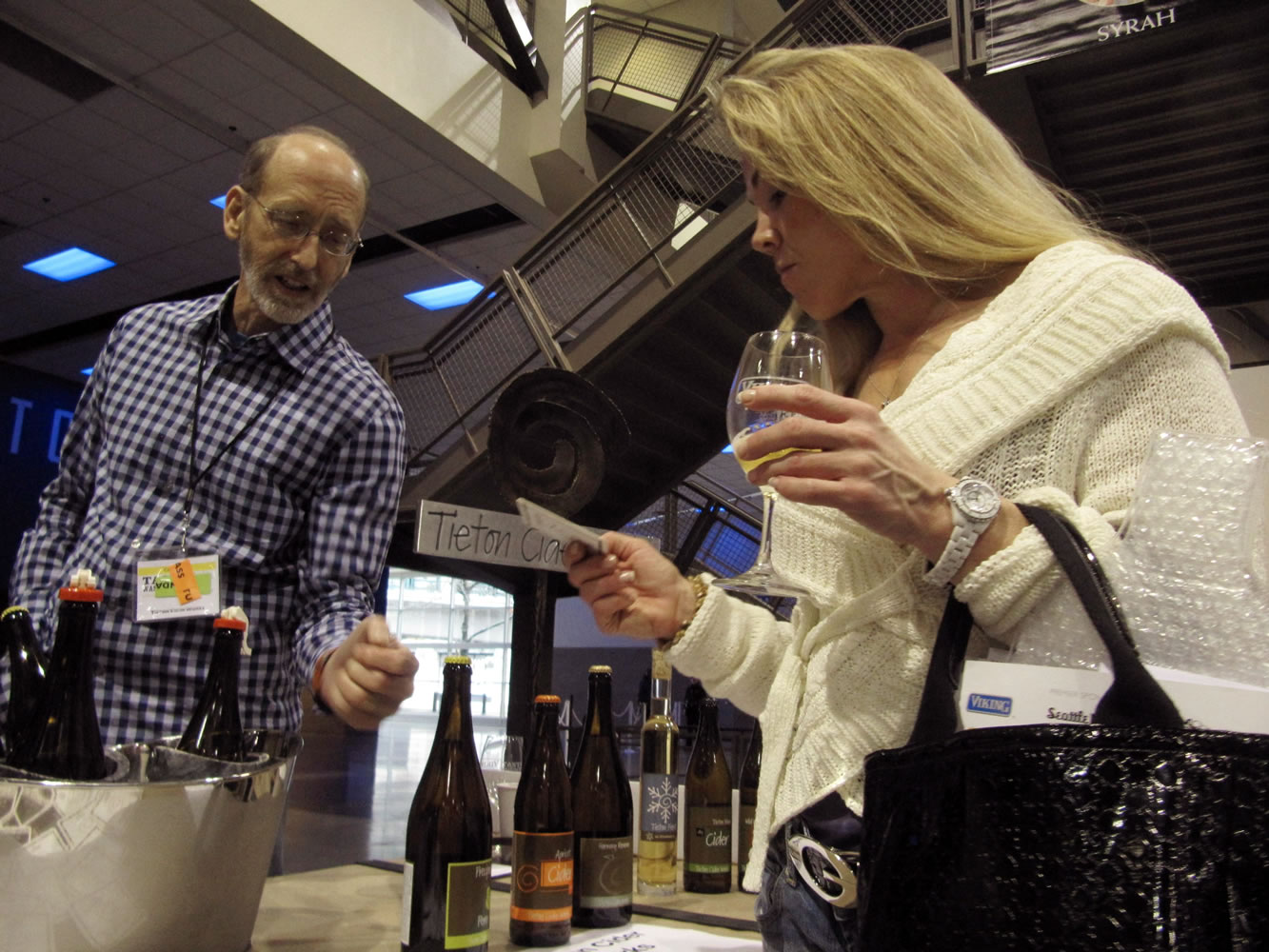SEATTLE — In one corner of the Northwest’s largest wine-tasting event, a handful of hard cider makers peddled potions fermented from Washington apples, pears, cherries and apricots.
No grapes? No problem for tasters. Wine connoisseurs and cider buffs alike could expect to see more such products to sample in the future.
Hard cider — traditionally the homegrown product of hobby farmers with backyard presses — has experienced a surge in popularity in the past decade, making it the fastest growing alcohol market nationally.
Nowhere is that growth more evident than the Northwest, home to the craft beer movement and hundreds of wineries. The Northwest Cider Association, which was created two years ago, has grown to more than a dozen members, keeping the region on pace with Northeast states.
Now, Washington researchers are working to boost the state’s cider industry by building a database of apple varieties to help growers and cider makers develop new products.
“This is a very strong industry and demand is still very high,” said Carol Miles of a Washington State University research and extension center in Northwest Washington. “The opportunity for putting a product on the market is very good.”
Cider has long been a popular beverage in Europe, where it often replaces wine on dinner tables in regions where grapes don’t flourish. Working-class Americans also enjoyed cider well into the 19th century, but as beer became more widely available, it soon replaced cider as the libation of choice.
Niche market
Despite recent growth, cider remains a relatively small, niche market in the United States. And in Washington, the country’s apple-producing capital, few orchards are devoted to the apple varieties traditionally pressed for cider.
At Taste Washington, the annual food and wine event held by the Washington Wine Commission, cider makers comprised only a handful of the 200 wineries on hand.
Washington is the nation’s No. 2 producer of premium wine behind California, with more than 740 wineries and 30,000-plus acres of wine grapes.
Cider makers say their inclusion in the event validates their
products and offers credibility and exposure at a critical time for the young industry.
“I like that we’re part of this spirited cider revival,” said Crystie Kisler of Finnriver Farm and Cidery in Chimacum, about 40 miles northwest of Seattle on the Olympic Peninsula. “It’s really been a pleasant surprise that drinkers are willing to try something different, and not only that, to be enthusiastic about it.”
East of Washington’s Cascade Range, Tieton Cider Works expects to produce 8,000 cases of cider this year — up from just 200 cases in 2009, its first year on the market. Eight different varieties are currently available.
“The market is growing exponentially. It’s outpacing — double — what beer and wine put together is seeing,” said Marcus Robert, manager and cider maker. “We have a fairly dynamic portfolio that hits just about everybody’s palate.”
Retail sales of cider have grown 30 percent nationally over the past year, though that figure doesn’t include many artisanal cider producers, said James Kohn of Wandering Aengus Ciderworks in Salem, Ore.
Wandering Aengus, created in 2004, produces the national CiderCon conference, where attendance doubled in its second year in March.
“Where craft beer is doing well, we’re doing well,” Kohn said. “A lot of stores in Washington and Oregon, and a couple of pockets around the country, understand that if you want to sell a lot of cider, you have to have varieties of cider on the shelf.”
Research effort
That’s where the research effort comes in: WSU’s Northwest Washington center in Mount Vernon, which grows 60 varieties of traditional cider apples, received $70,000 in two grants to compile fruit profiles and research better harvesting methods over the next two years.
They include growing trees on trellises, as is becoming widely used in the commercial apple industry, and harvesting apples with machines typically used to harvest raspberries.
Already, Washington’s cider industry has experienced so much growth that cider makers are importing juice from other states.
“We just don’t produce enough cider juice to satisfy our current cider makers,” Miles said. “Given this is an apple state, we’d like to see both sides of the industry grow together.”
That’s been the case with the region’s wine industry, which is throwing its support to its neighboring cider producers. Some wineries have included ciders in their own tasting events and invited cider makers to their winemaker dinners, viewing the co-promotion as an added boost for the region.
“The level of diversity and variety that consumers are interested in just makes the region a stronger draw,” Kisler said. “I don’t think we could have achieved early success independently without the assistance of the wine community. Hopefully we will all grow stronger going forward together.”



